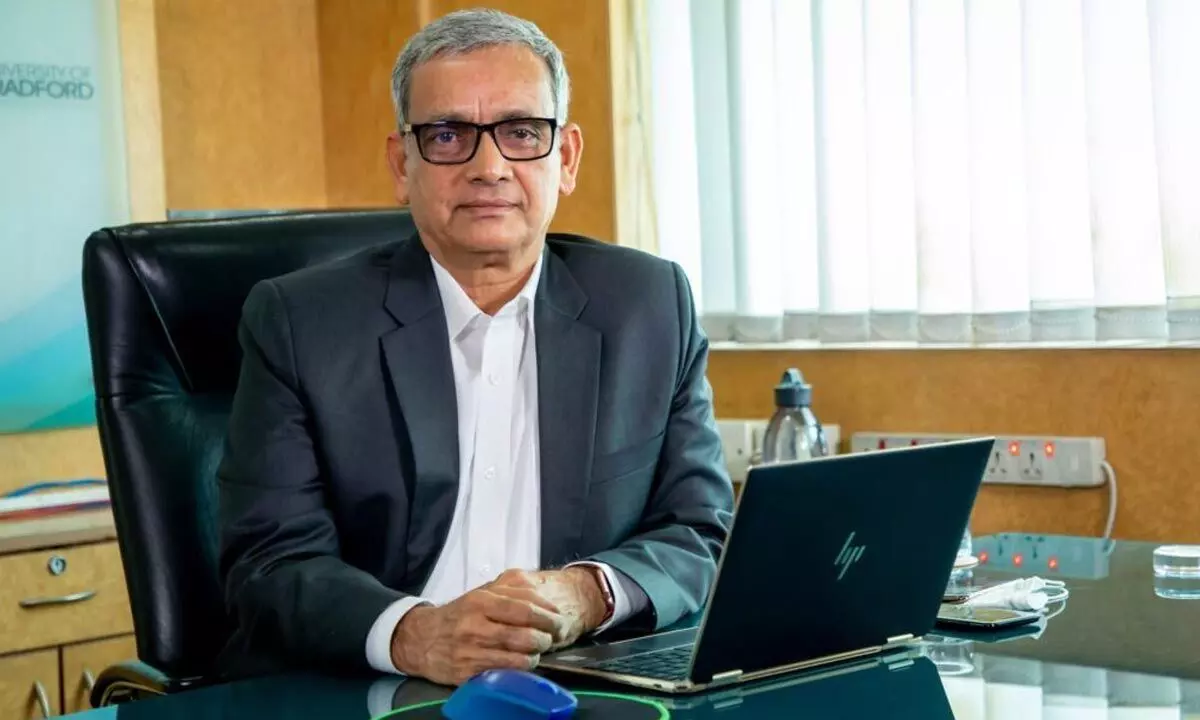Kali Prasad Gadiraju: Building world-class higher education useful in professional services industry

Kali Prasad Gadiraju: Building world-class higher education useful in professional services industry
Kali Prasad Gadiraju, Chairman of EThames College, Hyderabad, is a visionary who ardently follows the mission of building a world-class higher education brand focused on gifting great talent to the professional services industry.
Kali Prasad Gadiraju, Chairman of EThames College, Hyderabad, is a visionary who ardently follows the mission of building a world-class higher education brand focused on gifting great talent to the professional services industry. He has spent about 35 years in reputed professional services firms. During his stint in EY for 23 years, he gained expertise in internal audit, risk management and corporate governance not only as SME but also as an efficient leader.
Gadiraju is renowned as a leader capable of building practices at a solution level (GRC), Industry Level (Healthcare) and Area Level (Hyderabad, India). He has made the Internal Audit Services practice of EY the largest and the number one practice in India. His healthcare practice for EY also gained national prominence. He has a pivotal role in building EY Hyderabad into the number one firm in the market within the big 4 in just a few years after taking over as the OMP.
He is a Certified Internal Auditor from IIA-The Institute of Internal Auditors (USA), Certified Information Systems Auditor from ISACA (USA), and Certified Fraud Examiner from the Association of Certified Fraud Examiners (ACFE) USA.
Gadiraju is actively associated with TiE, Confederation of Indian Industry, FICCI, and CEO Clubs. He is the co-founder and former president of ISACA, New Delhi Chapter and former President of the Association of Certified Fraud Examiners, India Chapter.
What are the common challenges related to the relationship between industry and academia?
The primary obstacle lies in the disparity between what is being taught in academia and what the industry demands. The academic curriculum, whether at the undergraduate or postgraduate level, is either not directly applicable or excessively theoretical. Academic institutions fail to provide practical knowledge related to the industry's application side. Employers require graduates who are proficient in implementing theoretical concepts. For instance, the industry requires professionals such as data scientists, digital marketers, project managers, risk and compliance experts, and data analysts. However, academic institutions produce graduates who lack expertise in any of these areas. As a result, employers have to recruit these graduates and spend substantial resources on training them to meet job requirements.
How can academia continuously collaborate with the industry to ensure that the curriculum meets their needs?
Yes, academia should actively engage with the industry to continuously align their curriculum with industry needs. It's encouraging to see that some large IT companies, like TCS, are already collaborating with academic institutions to provide additional skills to interested students. However, to bridge the gap between academia and industry, it's necessary for leading recruiters like Deloitte and EY to work with academic institutions to align engineering and non-engineering course syllabi to meet their demands.
Furthermore, involving industry professionals in teaching is crucial, given that most academic professionals in India lack corporate or industrial experience. Academic institutions face the challenge of increasing the ratio of adjunct, practice, and clinical professors from the industry in their pedagogy to address this issue.
What do you recommend should be the strategy to help bridge this gap?
It is time for academia to expand their offerings beyond the university curriculum. Our institution has partnered with Coursera and Harvard Business Publishing to provide our students with world-class content. Additionally, we have developed customized programs for global MNCs to train their new hires and make them job-ready. To ensure our students are equipped with the skills and knowledge sought after by the industry, we encourage them to enroll for in-demand courses from Coursera and bring in industry experts to train them in specific areas such as data analytics or country-specific taxation laws like Canadian Tax etc.
Our faculty comprises industry veterans with over 20 years of experience in MNCs, ensuring our students receive practical and relevant insights. We have also introduced unique courses like Certified GRC Professional to meet the demands of big four and other global firms in the risk and compliance areas. Moving forward, we plan to launch courses in other areas such as Digital Supply Chain, SaaS Product Management, Project Management for ERP Implementation, Information Technology Audit, ESG, and more.
How should higher education be perceived by parents and students?
In the present scenario, generic degrees such as B.Tech, BBA, or B.Com will not provide you with the edge required to make the cut. Enterprise sector and MNC's are seeking candidates who possess specific skills like data scientists, cyber security specialists, full stack developers, risk management specialists, project managers, and accountants, to name a few. The degree is no longer a matter of concern for companies as long as the candidate can demonstrate their skill set. Therefore, students must choose their area of specialization and excel in it. At EThames, we provide various specializations that are in high demand, such as data science, data analytics, digital marketing, and risk management, among others.











